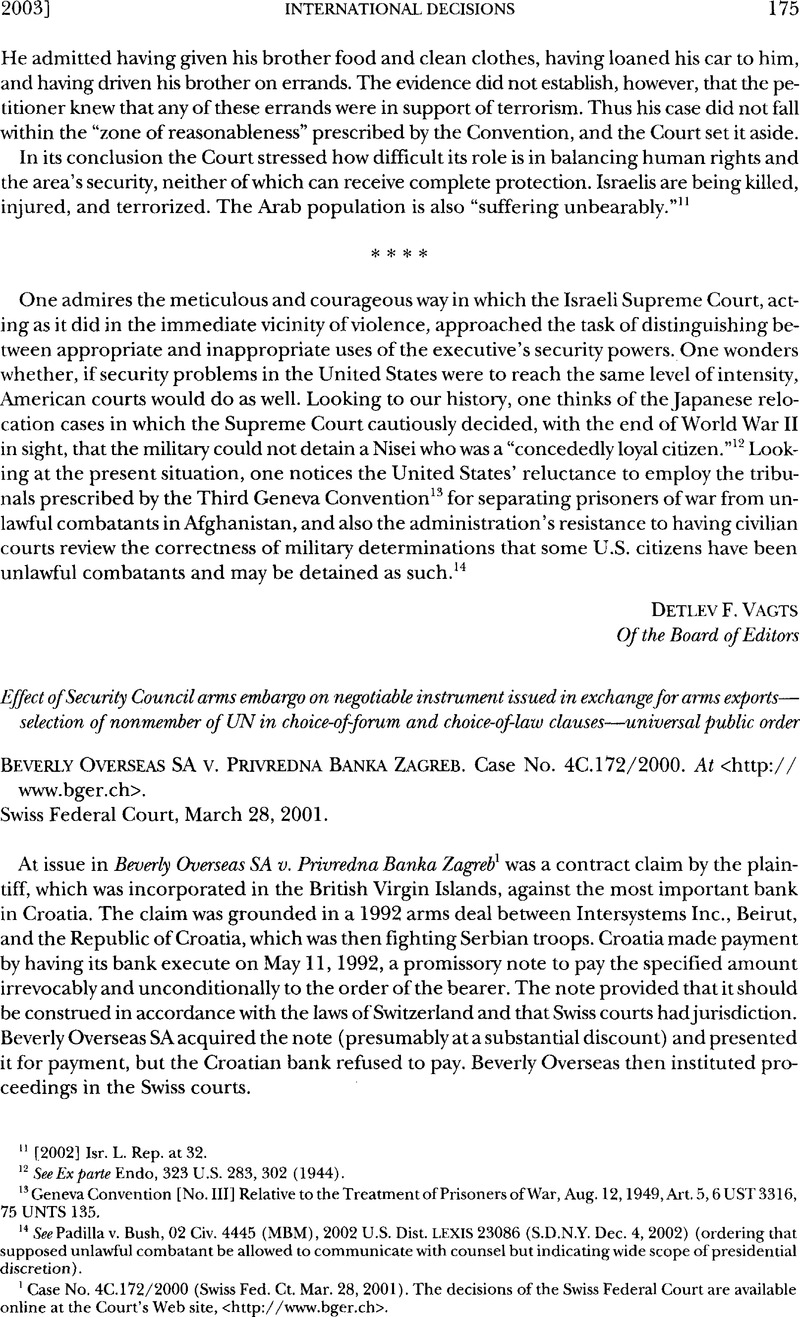No CrossRef data available.
Published online by Cambridge University Press: 27 February 2017

1 Case No. 4C.172/2000 (Swiss Fed. Ct. Mar. 28, 2001). The decisions of the Swiss Federal Court are available online at the Court’s Web site, <http://www.bger.ch>.
2 The Court held that Beverly Overseas, as successor in interest to Intersystems Inc., would be bound by the same considerations that would affect that original contracting party.
3 See BGE 123 III 101, Erwägung [Consideration] 2; BGE 115 II 232, Erwägung 4.
4 On a universal public order, see Kokott, Juliane, Grund- und Menschenrechte ah Inhalt eines internationalen ordre public, in Die Wirkungskraft der Grundrechte bei Fällen mit Auslandsbezug [The effects of fundamental rights in cases with foreign elements], 38 Berichte der Deutschen Gesellschaft für VölKerrecht 71 (1998)Google Scholar.
5 Beverly Overseas SA v. Privredna Banka Zagreb, Erwägung 5 (g).
6 SR 514.51.
7 SR 946.202. The Control of Goods Act was not relevant in the instant case because it regulates the export of dual-use goods and also goods that are used for military purposes but are not subject to the War Matériel Act (for example, military training planes).
8 War Matériel Act, Art. 11, sec. 1. Exports to nongovernmental entities were not permitted except for companies designated by governments as authorized importers. The act specifically disapproved exports to areas where there was an armed conflict under way, or the risk of such a conflict, or even dangerous tensions. Additionally, an application for the export of arms could be declined if there was reason to believe that the export might interfere with humanitarian or foreign aid to, or disrupt Swiss efforts to foster human dignity in, the importing country, or that humanitarian and foreign aid might be disturbed. Id., Art. 11, sec. 2.
9 Id., Art. 25.
10 See, e.g., Kokott, Juliane, Naturrecht und Positivismus im Völkerrecht—sind wir auf dem Weg zu einer Weltverfassung? in Recht und Internationalisierung 3 (Meier-Schatz, Christian & Schweizer, Rainer J. eds., 2000)Google Scholar; Karl, Wolfram, Das humanitäre Völkerrecht auf dem Weg vom Zwischenstaats-zum Weltrecht, in Development and Developing International and European Law 577 (Benedek, Wolfgang, Isak, Hubert, & Kickeret, Renate eds., 1999)Google Scholar.
11 It nevertheless remains an open question whether such concepts imply a prohibition of the supply of arms into areas of conflict even in the absence of a Security Council embargo.
12 It must also be noted, however, that Article 191 of the Swiss Constitution provides that jus cogens always has precedence over domestic law.